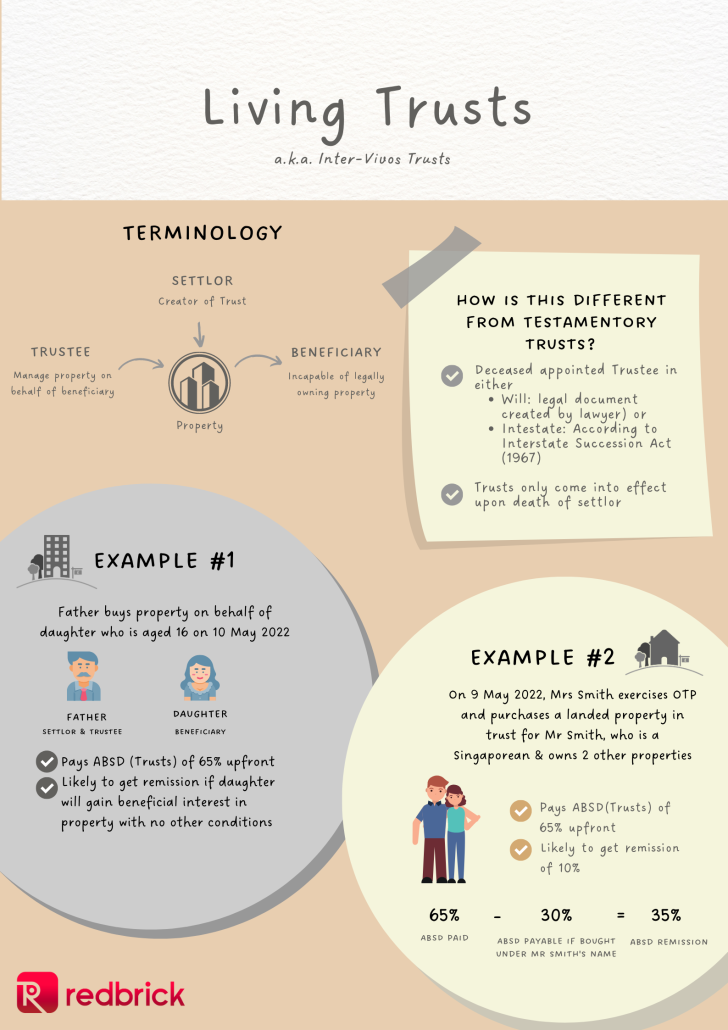Recently, a new tax was imposed in hopes to plug loopholes that have been exploited. It was announced that ABSD (Trust) will be implemented on properties that are transferred into living trusts. But what does this truly mean, and how would it affect you as a property buyer?
What is a Living Trust?
A living trust is created by a person when he is alive, and this person is also known as the settlor. In contrast, a testamentary trust is only created when the settlor passes on. The trust document designates another person, the trustee, the task to manage the assets for the beneficiary. A beneficiary is usually incapable of legally owning the property due to mental incapacity or if he is a minor.
The new regulation imposed is targeted only at living trust. It does not affect the properties that are willed to your loved ones.

What is Testamentary Trust?
Testamentary trust refers to the trusts in which appointment of trustee only occurs after the death of the settlor, and the trust is only created after death.
For instance, Mr and Mrs Lim will their property to their daughter who is 15 years old and a minor. As she is incapable of owning the property legally, her brother was appointed as the trustee. Her brother holds the property in trust for his sister. In this case, her parents are the settlors.
A year later, the couple passes away and the testamentary trust is created. The lawyer will then prepare and register the Deed. Such testamentary trust is not affected by ABSD, because the testamentary trust cannot be revoked. Also, the legal proceedings will follow the wishes indicated in the will which means that there is less likelihood of abuse.
From 9 May 2022 onwards, any transfer of residential property into a living trust was subjected to ABSD at a flat rate of 35%. After 27 April 2023, the rate was revised to 65%. The key word here is ‘residential’, as other property types are not affected.
The primary purpose is aimed at preventing trusts to act as a front to avoid other forms of taxation. It also targets trusts which have no intention for the beneficiary to become the real owner.
Plugging the loophole
Before 9 May 2022, trusts with no identifiable owner did not have to pay ABSD. This loophole has been exploited by those who did not create a genuine trust. The purpose of trust is to hold property for minors or those incapable of owning the property legally. However, many trusts have been exploiting the trust instrument by not creating a genuine trust or creating conditional or revocable trusts.
Another loophole that existed previously is through drafting a trust that does not give the beneficiary the property at the end of the day. In other words, the settlor remains in control of the property and simply wishes to avoid ABSD. This is no longer possible from 9 May 2022.
To further prevent exploitation, transfers into entities are also subject to Additional Conveyance Duties (ACD Trusts) from 10 May 2022 onwards. In short, if you transfer a living trust into an entity (not a person), you will need to pay ACD Trust.
ACD Trusts is a stamp duty chargeable on the transfer of shares of a company that holds the residential property (which comprises at least 50% of the company’s total tangible assets) and is aimed to plug all loopholes.
Implications of the new rule
- Requires trustee to pay ABSD (Trust) of 65% of the purchase price upon exercising the Option to Purchase before seeking a refund. This is in addition to the BSD.
- Trustee may apply for refund of ABSD (trust) if certain conditions are met
- Under the new law, there are some instances where the trustee will not be entitled to the refund. There are 3 strict conditions.
General Procedure
For instance, Mr Singh creates a trust and buys a residential property in trust of Mrs Singh. To determine whether he has to pay ABSD (Trusts), we have to first consider whether he is purchasing a resale property or a new property.
For resale properties, if:
- The OTP was granted by sellers to potential buyers on or after 26 April 2023;
- This OTP is exercised on or before 17 May 2023, or within the OTP validity period, whichever is earlier; and
- This OTP has not been varied on or after 27 April 2023,
The ABSD (Trusts) rate of 65% would apply which is in line with the calculation for stamp duties.
Similarly, the date of the Sales & Purchase (S&P) Agreement for new properties would be the reference date. Within 14 days, they will need to pay applicable BSD, as well as the ABSD of 65%. They may make an application to IRAS for refund within 6 months of setting up the trust. Otherwise, they would miss the cut-off date.

Conditions for Remission (or partial/full refund)
- Residential property is held on trust for identifiable individual beneficiaries only
● Set up trust to buy properties for unborn child – not identifiable - ABSD (Trust) of 65% has been paid
● Need to pay first, remission talk later - Application is made within 6 months from the date of the trust instrument
Is there an identifiable individual beneficiary?
This depends on the trust document structured. According to the IRAS website:
An identifiable individual beneficiary of a trust for whom an estate or interest in residential property is held on trust, is an individual —
(a) who is identified in the declaration of trust as a beneficiary of the property whether solely or together with another; and
(b) who, because of the trust, has beneficial ownership of the property (whether solely or together with another) that is not, under the terms of the trust, revocable, variable, or subject to any condition subsequent,
but excludes an individual who is entitled to any estate or interest in property in remainder or reversion.
The following are not considered to be an identifiable individual beneficiary:
(a) an individual who has not been born on the date of declaration of the trust;
(b) an individual who is entitled only to the income of the property under the trust;
(c) an individual whose estate or interest in the property under the trust is a contingent or discretionary interest, or who becomes entitled to an estate or interest in the property only upon revocation of the trust.
In layman terms, this means that not only must there be a clear person(s) indicated as beneficiary(s), there should also not be further conditions imposed on the validity of the trust document.
In most instances, trusts do satisfy condition (a). However, condition (b) might not be satisfied as many trusts have terms that must be abided to.
From the authorities’ standpoint, since the trust has beneficial ownership of the property, the trust document must not be able to be revoked or subject to conditions.
If the trust is genuine, there should not be conditions, such as the beneficiary will receive the property when he turns 21 years old, or he can only get the property when he graduates from university. This highlights the importance of having no conditions for the interests of the beneficiaries to be valid.
Additionally, there are some cases where there is no identifiable individual beneficiary. Individuals who are not yet born on the date of declaration of the trust are not identifiable individual beneficiaries.
Some trusts are also structured such that beneficiaries are only entitled to the income of the property and not the title, which would deem them as an unidentifiable individual beneficiary. An individual whose interests or rights in the property under the trust is contingent (subject to) certain conditions, would not be identifiable.
ABSD (trust): Example #1
On 26 April 2023, John Lim signed the S&P and purchased a residential property using trust for his wife, June Lim. June is a Singaporean Citizen who already owns another residential property. The trust instrument states that June is the sole beneficiary owner of the property. There are no further conditions imposed. John Lim paid the required ABSD (Trust) rate of 65%.
Question: Is John eligible for remission?
June Lim is a clearly identified beneficiary and her ownership of the property is not subjected to any other conditions. He is eligible for remission provided that he applied within the 6 months deadline (from the date the trust instrument is implemented) with the necessary documents.
However, he will not be able to claim a full refund. He will be eligible for the remission of the difference between the ABSD (Trust) amount paid and the ABSD payable if his wife had purchased the property directly in her name.
As this is June’s second property, she would have been required to pay ABSD of 20%. Thus, the refund would be 45% (65% – 20%) of the purchase price or market value (whichever higher) of the residential property.
ABSD (trust): Example #2
On 26 April 2023, Peter Goh executed a declaration of trust that he is holding on to a condominium unit for his 2 children, Tom and Jerry. The trust states that Tom is a beneficial owner of 50% of the shares and Jerry is only entitled to 50% share of the unit when he graduates from university. Peter paid ABSD (trust) upon execution of declaration of trust.
Question: Is Peter eligible for remission?
As Jerry’s 50% interest of the property is subject to his graduation from university, he is not an identifiable individual beneficiary. Thus, this condition for remission is not met. Therefore, no remission will be granted.
ABSD (trust): Example #3
On 26 April 2023, Alice executed a declaration of trust. It states that she is holding on to a bungalow unit on behalf of her child. Her child, Darren, is a minor. The trust states that Darren’s interest will be beneficially vested when he turns 21. Alice paid ABSD (trust) of 65% upon execution of declaration of trust.
Question: Is Alice eligible for remission?
The answer is no.
The remission condition is based on vested beneficial ownership at the time the property is transferred into the trust. In this case, the deferred beneficial ownership would only occur in the future, when Darren turns 21. Unlike legal interest in properties which requires individuals to be at least 21 years of age, beneficial interest can exist before one turns 21 years old. In other words, this means that the condition for ABSD (Trust) Remission has not been met.
Conclusion

With the implementation of ABSD(Trusts), there is a higher likelihood of individuals being willing to pay ABSD upfront. Instead of using trusts as a mechanism, as the remission of funds could be contentious. Furthermore, properties bought under trust must be paid in cash. The 65% ABSD which also has to be paid in cash. Which would mean buyers must have sufficient monies on hand to pay the fees upfront.
As the structure of individual trusts are subjective to the structure indicated in the deed and there is no fixed structure, there is no one-size-fit-all answer. We strongly recommend for you to talk to our mortgage advisors and your lawyers to determine whether you are likely to be eligible for the remission based on your unique situation.
Want to find the best mortgage rate in town? Check out our free comparison service to learn more!
Read more of our posts below!

